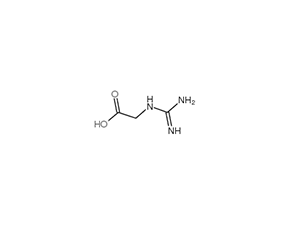
Guanidoacetic acid
CAS No. 352-97-6
Guanidoacetic acid( Glycocyamine | AI3-17119 | AI3 17119 | AI317119 )
Catalog No. M18468 CAS No. 352-97-6
Guanidinoacetic acid, a precursor of creatine, is a replacement of dietary arginine and could support overall energy homeostasis of the bird.
Purity : >98% (HPLC)
 COA
COA
 Datasheet
Datasheet
 HNMR
HNMR
 HPLC
HPLC
 MSDS
MSDS
 Handing Instructions
Handing Instructions
| Size | Price / USD | Stock | Quantity |
| 100MG | 37 | In Stock |


|
| 200MG | Get Quote | In Stock |


|
| 500MG | Get Quote | In Stock |


|
| 1G | Get Quote | In Stock |


|
Biological Information
-
Product NameGuanidoacetic acid
-
NoteResearch use only, not for human use.
-
Brief DescriptionGuanidinoacetic acid, a precursor of creatine, is a replacement of dietary arginine and could support overall energy homeostasis of the bird.
-
DescriptionGuanidinoacetic acid, a precursor of creatine, is a replacement of dietary arginine and could support overall energy homeostasis of the bird. Guanidinoacetic Acid is an important marker for renal failure, kidney transplantation, and the renal metabolic activity. The compound is a metabolite of guanidine.
-
In Vitro——
-
In Vivo——
-
SynonymsGlycocyamine | AI3-17119 | AI3 17119 | AI317119
-
PathwayOthers
-
TargetOther Targets
-
RecptorOthers
-
Research Area——
-
Indication——
Chemical Information
-
CAS Number352-97-6
-
Formula Weight117.11
-
Molecular FormulaC3H7N3O2
-
Purity>98% (HPLC)
-
SolubilityIn Vitro:?1M HCl : 50 mg/mL (426.95 mM)
-
SMILESN=C(N)NCC(=O)O
-
Chemical NameGlycine, N-(aminoiminomethyl)-
Shipping & Storage Information
-
Storage(-20℃)
-
ShippingWith Ice Pack
-
Stability≥ 2 years
Reference
1. Dilger RN, et al. Dietary guanidino acetic acid is an efficacious replacement for arginine for young chicks. Poult Sci. 2013 Jan;92(1):171-7.
molnova catalog



related products
-
(S,R,S)-AHPC-PEG2-NH...
(S,R,S)-AHPC-PEG2-NH2 (VH032-PEG2-NH2) is a synthesized E3 ligase ligand-linker conjugate that incorporates the (S,R,S)-AHPC based VHL ligand and 2-unit PEG linker used in the synthesis of PROTACs.
-
Saikosaponin H
Saikosaponin H is a natural product from Bupleurum chinense.
-
Nortrachelogenin-8'-...
Nortrachelogenin-8'-O-beta-glucoside is a lignan with a diarylhydroxybutyrolactone skeleton which isolated from the leaves and stems of Trachelospermum jasminoides (Lindl.) Lem.



 Cart
Cart
 sales@molnova.com
sales@molnova.com


